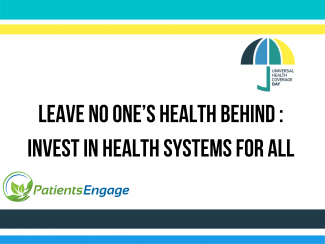
The theme for UHC2021 is "Leave No One’s Health Behind : Invest in Health Systems For All". We explore what right to health means for people and what investments need to be made in health systems to enable each one of us to be better informed about health, to be able to be pro-actively engaged with our health and to feel empowered to make better decisions and better choices.
“ The enjoyment of the highest attainable standard of health is one of the fundamental rights of every human being without distinction of race, religion, political belief, economic or social condition” – these words were adopted in the Constitution of the World Health Organisation more than 70 years ago. With the Covid pandemic , these words are even more applicable today and for the future
In practical terms, the right to health should enable every individual to be entitled to the following :
- Have easy access to information that helps them to identify various options and to make the right choices to better manage their health. This is in contrast to either not knowing what options are available or being forced into a sub-optimal choice because the health system does not prioritise provision of information. Information should be available in local language, in accessible formats and multi-media.
- Have access to preventative care (screening, testing) in a timely and regular manner. This will lead to significant health and financial benefits in the future by early detection of potential chronic conditions. This aspect tends to be overlooked by most existing health systems that are geared more towards treating conditions after they occur rather than focus on prevention that would greatly reduce the burden on the health system.
- Have access to and be provided with the treatment and care that is most appropriate for their condition, keeping in mind the immediate as well as long term health outcomes. This would include sufficient information about potential side effects of the treatment as well as consequences of the condition and guidance on managing these.
- Have access to supportive and rehabilitative care. Most conditions, especially chronic diseases, need significant post-treatment care that could potentially last a lifetime. Most health systems currently do not pay attention to this important aspect, leaving the patients and family caregivers to fend for themselves after the initial treatment phase. In order to improve patients’ health-related quality of life (HRQOL), a more holistic approach that includes lifestyle guidance, physical and psychological counselling, regular ongoing monitoring and screening needs to be incorporated.
- Feel empowered to ask for and get the help required to navigate the pathways of the healthcare system that can be complicated in most cases.
- Finally, all the above aspects of healthcare needs to be affordable and accessible to all, irrespective of employment, social and economic status. Health insurance and coverage is getting a lot of attention from governments and regulators which is a welcome development. It is very important that such insurance does not just cover the treatment phase of the patients’ journey. Significant costs are involved in preventative screening and testing, and post treatment supportive and rehabilitative care, which also need to be sufficiently covered. In chronic conditions, it is estimated that more than 90% of care takes place outside the clinical arena and hence the associated costs could be a major challenge if not adequately addressed and covered
We need to treat patients and their families as partners in care and important stakeholders in healthcare systems in order to meet the goal of highest attainable standard of health for everyone.
Must Read: What patient and disability advocates shared on this
Changed
12/Dec/2021
Community






